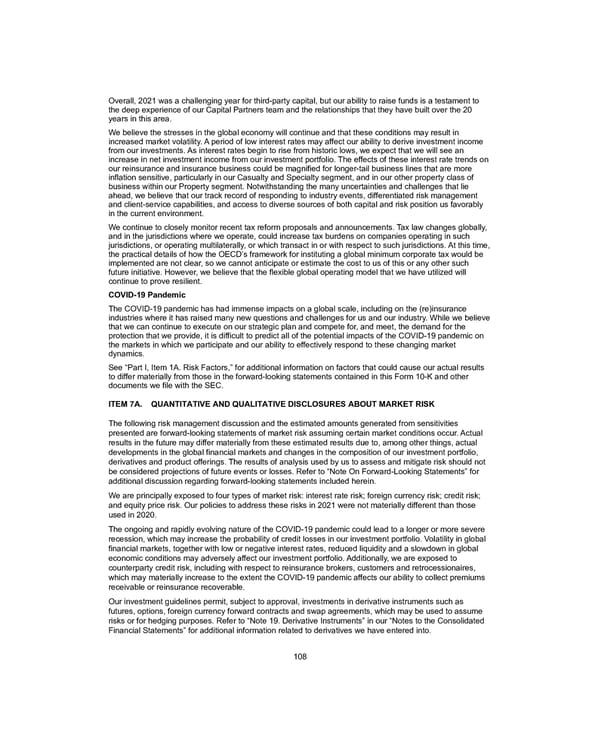Overall, 2021 was a challenging year for third-party capital, but our ability to raise funds is a testament to the deep experience of our Capital Partners team and the relationships that they have built over the 20 years in this area. We believe the stresses in the global economy will continue and that these conditions may result in increased market volatility. A period of low interest rates may affect our ability to derive investment income from our investments. As interest rates begin to rise from historic lows, we expect that we will see an increase in net investment income from our investment portfolio. The effects of these interest rate trends on our reinsurance and insurance business could be magnified for longer-tail business lines that are more inflation sensitive, particularly in our Casualty and Specialty segment, and in our other property class of business within our Property segment. Notwithstanding the many uncertainties and challenges that lie ahead, we believe that our track record of responding to industry events, differentiated risk management and client-service capabilities, and access to diverse sources of both capital and risk position us favorably in the current environment. We continue to closely monitor recent tax reform proposals and announcements. Tax law changes globally, and in the jurisdictions where we operate, could increase tax burdens on companies operating in such jurisdictions, or operating multilaterally, or which transact in or with respect to such jurisdictions. At this time, the practical details of how the OECD’s framework for instituting a global minimum corporate tax would be implemented are not clear, so we cannot anticipate or estimate the cost to us of this or any other such future initiative. However, we believe that the flexible global operating model that we have utilized will continue to prove resilient. COVID-19 Pandemic The COVID-19 pandemic has had immense impacts on a global scale, including on the (re)insurance industries where it has raised many new questions and challenges for us and our industry. While we believe that we can continue to execute on our strategic plan and compete for, and meet, the demand for the protection that we provide, it is difficult to predict all of the potential impacts of the COVID-19 pandemic on the markets in which we participate and our ability to effectively respond to these changing market dynamics. See “Part I, Item 1A. Risk Factors,” for additional information on factors that could cause our actual results to differ materially from those in the forward-looking statements contained in this Form 10-K and other documents we file with the SEC. ITEM 7A. QUANTITATIVE AND QUALITATIVE DISCLOSURES ABOUT MARKET RISK The following risk management discussion and the estimated amounts generated from sensitivities presented are forward-looking statements of market risk assuming certain market conditions occur. Actual results in the future may differ materially from these estimated results due to, among other things, actual developments in the global financial markets and changes in the composition of our investment portfolio, derivatives and product offerings. The results of analysis used by us to assess and mitigate risk should not be considered projections of future events or losses. Refer to “Note On Forward-Looking Statements” for additional discussion regarding forward-looking statements included herein. We are principally exposed to four types of market risk: interest rate risk; foreign currency risk; credit risk; and equity price risk. Our policies to address these risks in 2021 were not materially different than those used in 2020. The ongoing and rapidly evolving nature of the COVID-19 pandemic could lead to a longer or more severe recession, which may increase the probability of credit losses in our investment portfolio. Volatility in global financial markets, together with low or negative interest rates, reduced liquidity and a slowdown in global economic conditions may adversely affect our investment portfolio. Additionally, we are exposed to counterparty credit risk, including with respect to reinsurance brokers, customers and retrocessionaires, which may materially increase to the extent the COVID-19 pandemic affects our ability to collect premiums receivable or reinsurance recoverable. Our investment guidelines permit, subject to approval, investments in derivative instruments such as futures, options, foreign currency forward contracts and swap agreements, which may be used to assume risks or for hedging purposes. Refer to “Note 19. Derivative Instruments” in our “Notes to the Consolidated Financial Statements” for additional information related to derivatives we have entered into. 108
 2021 Annual Report Page 123 Page 125
2021 Annual Report Page 123 Page 125